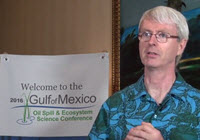The Oil-Marine Snow-Mineral Aggregate Interactions and Sedimentation during the 2010 Deepwater Horizon Oil Spill project is lead by P.I. Adrian Burd, University of Georgia.
The goal of this project will be to use coagulation theory to develop a predictive, mechanistic model for how oil coagulates with particulate material in the marine environment. There is strong observational evidence that oil interacts with particles in the marine environment forming heterogeneous aggregates comprised of oil droplets, mineral particles such as clay and silica, and biological particles such as phytoplankton cells, zooplankton fecal pellets, and marine snow (large heterogeneous aggregates). Such oil-aggregates have been observed in surface waters and in sediment traps, indicating that oil contained in these aggregates can be transported vertically from the surface to the deep ocean, ultimately providing a flux of oil to the seafloor.
Click for access to GoMRI’s YouTube videos of RFP-V Projects…
************
This project was funded by the Gulf of Mexico Research Initiative (GoMRI) in the RFP-V funding program.
The Gulf of Mexico Research Initiative (GoMRI) is a 10-year independent research program established to study the effect, and the potential associated impact, of hydrocarbon releases on the environment and public health, as well as to develop improved spill mitigation, oil detection, characterization and remediation technologies. An independent and academic 20-member Research Board makes the funding and research direction decisions to ensure the intellectual quality, effectiveness and academic independence of the GoMRI research. All research data, findings and publications will be made publicly available. The program was established through a $500 million financial commitment from BP. For more information, visit http://gulfresearchinitiative.org/.

